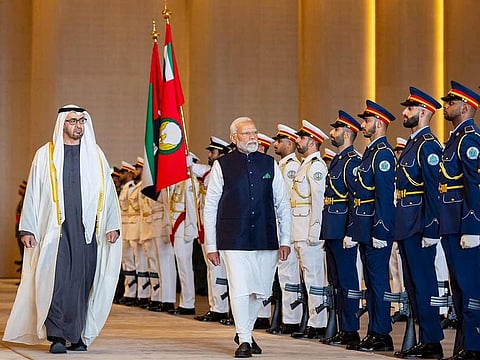Modi’s UAE visit paves path to prosperity
Pragmatism and mutual interests guide visionary relationship between UAE and India

The optics of Indian prime minister Narendra Modi’s inaugurating a magnificent new Bochasanwasi Akshar Purushottam Swaminarayan (BAPS) temple in the UAE, so soon after the consecration of the Ram Mandir in Ayodhya, are unmistakable.
It signals the dawn of new watermark of friendship between the UAE and India, in addition to an era of openness and tolerance. Such “terms of endearment” are quite appropriate for St Valentine’s Day, whose deeper significance extends beyond romantic passion to spiritual friendship and love that is selfless, unconditional, and pure-hearted.
Indeed, the spiritual and the worldly go hand-in-hand in the warmth of the ties between India and the UAE. With its large subcontinental population, UAE has transformed the lives of millions not only within its borders but back home too, with what is known as the remittance economy.
Yet it took a visionary leadership in both countries to understand the true potential of the partnership. This is Modi’s 7th visit to the UAE — the most progressive and powerful country in the region. This is also Modi’s 15th trip to the region.
To commemorate its significance, India and the UAE signed off on a transcontinental trade corridor, a perfect material complement to the spiritual bridge that the temple presents. India’s relations with the Arab peninsula and Gulf nations are at an all-time high.
The trade corridor, an impressive achievement if it fructifies, would extend to Europe, connecting a whole host of countries by sea and rail, thus opening a surface passageway with enormous economic and strategic advantages. What is more this ambitious project enjoys the backing of the United States and the European Union.
Though details are awaited, the barebone specs, emphasising “regional connectivity,” have already released by India’s Ministry of External Affairs. Gulf News readers may recall that the corridor was announced in September 2023 at the G20 summit in New Delhi.
In his meeting with Modi on Feb. 13, UAE President His Highness Sheikh Mohamed Bin Zayed Al Nahyan, said, “Today, our region is going through a difficult time but because of our relationship with you, we are building a lot of hope and looking forward to a future with India that is on par with our ambitions.”
The two countries also inked other treaties, including bilateral investment deals and agreements on trade and digital infrastructure. Modi addressed an estimated 20,000-strong crowd of leading diaspora Indians in the Gulf at a large stadium, making it a fitting finale to a decade of strengthening ties, with the UAE gradually emerging as one of India’s top trading partners.
Changing geopolitical, regional, strategic, and economic factor have all contributed to the closeness of ties between India and its Arab neighbours. The overriding factor has been the triumph of constructive, even visionary diplomacy, marked both by pragmatism and mutual self-interest.
Nothing underlines this shift more than the personal warmth and quality of ties between the leaders in both countries. That demonstrates the qualitative uptick in the relationship more than anything else.
Developing a personal relationship with UAE leadership and leaders in the region has been the key. That is what has created an atmosphere of mutual trust, so crucial to improving ties.
Counter-terrorism, rule of law, political stability, economic cooperation, and security guarantees — all these and much more — can be the solid foundation on which to build a great and peaceful future for the entire region.




